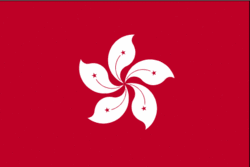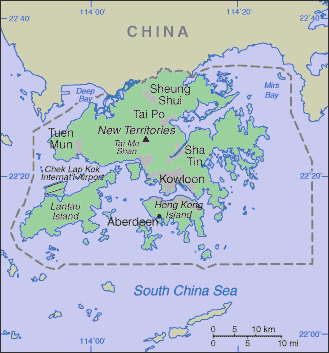Traveling Luck for Hong Kong S.A.R., China. Hong Kong S.A.R., China, Asia
Hong Kong is located in Eastern Asia, bordering the South China Sea and China.
Land in Hong Kong is hilly to mountainous with steep slopes; lowlands in north.
Chinese/Hong Kong land covers an area of 1092 square kilometers which is six times the size of Washington, DC
 Chinese/Hong Kong national flag (Flag of Hong Kong S.A.R., China)
Chinese/Hong Kong national flag (Flag of Hong Kong S.A.R., China)
As for the Chinese/Hong Kong climate; subtropical monsoon; cool and humid in winter, hot and rainy from spring through summer, warm and sunny in fall.
Chinese/Hong Konger speak Chinese (Cantonese), English; both are official.
Places of note in Hong Kong S.A.R., China
 Chinese/Hong Kong map
Chinese/Hong Kong map
Regions of Hong Kong S.A.R., China
Occupied by the UK in 1841, Hong Kong was formally ceded by China the following year; various adjacent lands were added later in the 19th century. Pursuant to an agreement signed by China and the UK on 19 December 1984, Hong Kong became the Hong Kong Special Administrative Region (SAR) of China on 1 July 1997. In this agreement, China has promised that, under its "one country, two systems" formula, China's socialist economic system will not be imposed on Hong Kong and that Hong Kong will enjoy a high degree of autonomy in all matters except foreign and defense affairs for the next 50 years.
Hong Kong has a free market, entrepot economy, highly dependent on international trade. Natural resources are limited, and food and raw materials must be imported. Gross imports and exports (i.e., including reexports to and from third countries) each exceed GDP in dollar value. Even before Hong Kong reverted to Chinese administration on 1 July 1997, it had extensive trade and investment ties with China. Hong Kong has been further integrating its economy with China because China's growing openness to the world economy has made manufacturing in China much more cost effective. Hong Kong's reexport business to and from China is a major driver of growth. Per capita GDP is comparable to that of the four big economies of Western Europe. GDP growth averaged a strong 5% from 1989 to 2005, but Hong Kong suffered two recessions in the past eight years because of the Asian financial crisis in 1997-1998 and the global downturn in 2001-2002. Although the Severe Acute Respiratory Syndrome (SARS) outbreak in 2003 also battered Hong Kong's economy, a solid rise in exports, a boom in tourism from the mainland because of China's easing of travel restrictions, and a return of consumer confidence resulted in the resumption of strong growth from late 2003 through 2005.
Chinese/Hong Kong natural resources include outstanding deepwater harbor, feldspar
more than 200 islands
Chinese/Hong Kong religion is eclectic mixture of local religions 90%, Christian 10%.
Natural hazards in Hong Kong include occasional typhoons.
Travel Advice for Hong Kong S.A.R., China
Hong Kong (Special Administrative Region of China)SUMMARY
- The threat from terrorism in Hong Kong is low. But you should be aware of the global risk of indeterminate terrorist attacks, which could be against civilian targets, including places frequented by foreigners.
- Around 540,000 British tourists visit Hong Kong every year. Most visits are trouble-free. The main type of incident for which British nationals require consular assistance in Hong Kong is for replacing lost and stolen passports and petty crimes. You should take sensible precautions against pickpocketing and other street crime.
- Throughout 2006 the Hong Kong press reported instances of spiked drinks. You should ensure that anything you drink cannot be tampered with. You should also be wary of accepting drinks from strangers. Please see the Crime Section of this travel advice for more details.
- The typhoon season in Hong Kong normally runs from April to October. Please see the Natural Disasters section of this Travel Advice and Hurricanes for more information.
- We strongly recommend that you obtain comprehensive travel and medical insurance before travelling. You should check any exclusions, and that your policy covers you for the activities you want to undertake. Please see: Travel Insurance
SAFETY AND SECURITY
LOCAL LAWS AND CUSTOMS
ENTRY REQUIREMENTS
Single parents or other adults travelling alone with children should be aware that some places require documentary evidence of parental responsibility before allowing lone parents to enter, or in some cases, before permitting the children to leave. For further information on exactly what will be required at immigration please contact the Hong Kong Economic and Trade Office in London at: http://www.hketolondon.gov.hk before travelling.
Visits to Mainland China
Those travelling on a British passport to Mainland China via Hong Kong must obtain a Chinese visa before arrival at the border. Visas are not available on arrival at the Chinese border for British passport holders. Failure to follow this guideline could result in a fine and possible detention by the Mainland Chinese authorities. Visitors entering Hong Kong via mainland China and leaving again via the mainland should note they will need to be in possession of a double or multiple entry visa for mainland China.
HEALTH
The UK and Hong Kong Reciprocal Health Care Arrangement terminated on 30 June 1997.
You may undergo temperature screening at borders. Depending on results, further medical examinations may be required.
Every year several cases of dengue fever are reported in Hong Kong. The numbers are small in comparison to the total population and outbreaks have been localised. You are recommended to take precautions against mosquito bites.
You should seek medical advice before travelling and ensure that all appropriate vaccinations are up-to-date. For further information on health, check the Department of Health website at www.dh.gov.uk.
Avian Influenza (Bird Flu)
In January 2007 there were a few reported cases of Avian Influenza (Bird Flu) in Hong Kong but only in birds. No human infections or deaths have been reported. The World Health Organisation (WHO) has confirmed human cases elsewhere in the region and there have been human fatalities in China. If you plan to visit China please also view the latest China Travel Advice.
The risk to humans from Avian Influenza is believed to be very low. As a precaution, you should avoid visiting live animal markets, poultry farms and other places where you may come into close contact with domestic, caged or wild birds; and ensure poultry and egg dishes are thoroughly cooked.
You should read this advice in conjunction with the Avian and Pandemic Influenza Factsheet, which gives more detailed advice and information.
NATURAL DISASTERS
The typhoon season in Hong Kong normally runs from April to October. You should monitor local and international weather updates from the World Meteorological Organisation (WMO). You can also access http://www.nhc.noaa.gov for updates. Please also see Hurricanes for more information.
Typhoons very occasionally hit Hong Kong and may cause flooding and landslides. Warning is given in advance. Public offices shut down when the "Typhoon 8" signal is hoisted.
GENERAL
Employment

 Search
Search Hong Kong S.A.R., China country profile
Hong Kong S.A.R., China country profile Travel advice for Hong Kong S.A.R., China
Travel advice for Hong Kong S.A.R., China